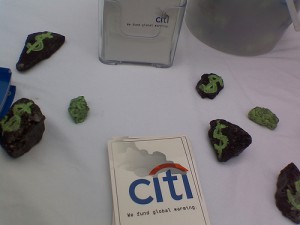 In 2009 RAN urged Citi to stop financing mountaintop removal (MTR) coal mining, the environmental tragedy that is destroying the Appalachian landscape and poisoning communities.
In 2009 RAN urged Citi to stop financing mountaintop removal (MTR) coal mining, the environmental tragedy that is destroying the Appalachian landscape and poisoning communities.
Citi’s initial response, a statement on their website that the bank had “has implemented a robust MTR Environmental Due Diligence Process” was a disappointment to us. While Citi had at least acknowledged that MTR mining is a critical issue, we were not hearing any commitment from the bank to end their financing.
However one line, gave a glimmer of hope. “Based on implementation experience, we will review and revise our MTR Environmental Due Diligence process over time and as regulations change.”
We’ve been talking to Citi over the past year, urging the bank to strengthen this policy, to adopt a strong identifiable threshold for transactions that they will not accept and to publicly report on the policy’s implementation.
Yesterday, the bank released their 2009 Citizenship report and there is a significant section on their MTR policy.
Our assessment is that Citi is making some progress, but still has a way to go.
One of the things that I like is their reporting on the number of MTR company transactions that have been through Citi’s ‘enhanced due diligence process’ (3) and the number of transactions that were approved and closed (2). This tells us that there is some substance to the policy and that there is at least one MTR company Citi is not prepared to do business with.
I am not going to speculate on the identity of the company that Citi didn’t do business with, however a few hours of research on Bloomberg gives a picture of whom Citi will fund. Since August 2009, when Citi adopted their MTR policy, Citi has done business with at least two MTR mining companies: TECO Energy (the 7th largest producer of MTR coal in 2009) and CONSOL Energy (11th largest).
The Citi policy is an interesting contrast to one released by Bank of America, in December last year, which sets out a clear performance standard “We will phase out financing of companies whose predominant method of extracting coal is through mountain top removal.” This is easier at-a-glance to hold the bank to account over, however we’ve yet to see the level of transparent reporting that Citi are giving us.
A similar Bloomberg search on Bank of America transactions reveals financial transactions with TECO and CONSOL, since their policy was adopted, plus the information that Bank of America is listed as the largest stockholder of shares in Alpha Natural Resources (the 3rd biggest producer of MTR coal in Appalachia).
So Citi and Bank of America both have a way to go before they can say they are no longer financing Appalachian mountain destruction. Yet, for now, they can hold their heads up a little higher than Chase bank, the biggest US financier of MTR coal mining, who has no policy on mountaintop removal mining at all. It seems to me that Chase is missing an opportunity here.